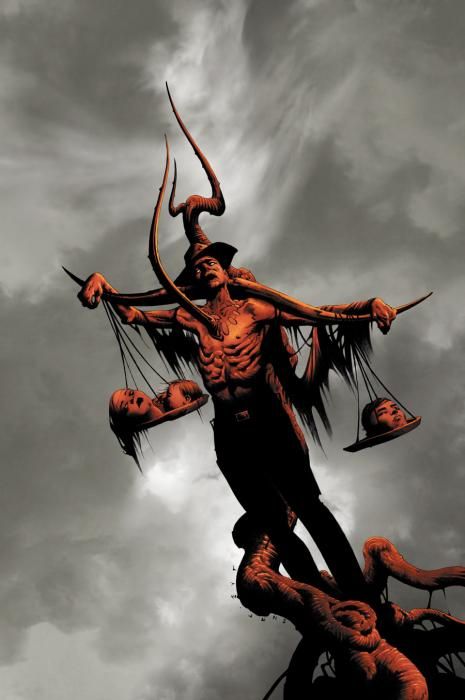"Trinity of Sin: Phantom Stranger" #10 continues the Stranger's crusade to reclaim his lost family through the words of J.M. DeMatteis and the images of Fernando Blanco. While readers have seen interpretations of Heaven before in comics, this creative team throws their own spin on the concept as the Phantom Stranger is brought through Heaven's gate by an avatar of God.
As has been the case throughout this series, the Scottish terrier stand-in with the voice of God guides the Stranger, acting as both Sherpa and conscience. Once through Heaven's doors, the scene he faces puzzles the Stranger, as he wonders how he will ever find his family to bring them back to the land of the living. DeMatteis continues to weave tales of morality and spirituality around the Phantom Stranger, but grafts those tales to the love-fueled quest the Stranger is set upon. It's difficult not to feel empathy for the Stranger, whose heart is already shattered, as the Heaven-set developments continue to complicate the search and restrict his chance of success. Overwhelmed by the chore of finding three souls in Heaven, the Stranger receives a guide in Zauriel, hand-picked by the God-dog himself to assist the Stranger in finding the answers he seeks and the peace he craves. This interpretation of Zauriel is homogenized compared to the rebellious free spirit Grant Morrison created, but this is also his first appearance and his role it homogenous as well.
Blanco draws a darkly idyllic interpretation of the afterlife. While some of the appearance must be credited to colorist Brad Anderson, the fields of Heaven that greet the Stranger once he completes his ascent up the spiral stairway are dark and shadowy. There are no rainbows, moonbeams or rays of sunshine, just hopeless souls trying to find their way. As the journey continues and the Stranger nears his goal, the palette shifts to a considerably brighter tone, just as the story slides away from a completely happy ending. Blanco's characters are hewn from shadow and his style floats somewhere near Phil Hester's, but with a less distinct grain on his characters. It works for the Stranger, Zauriel, Terrance Thirteen and the Question, but some of the ancillary characters in "Trinity of Sin: Phantom Stranger" #10 don't wear it well.
I find it ironic that not only are the concepts of Heaven or Hell no longer taboo for comics (and DC in particular) but that the encounter in this issue is as mundane as the reset of characters and storylines. What was once restricted even in titles recommended for mature readers is now fair game, if only to drive a story and sell some books. I'm not saying the work DeMatteis does here is any less interesting or entertaining than what Rick Veitch once planned for his work on Swamp Thing, but Heaven and Hell are simply settings now. That's unfortunate as DeMatteis and company deliver an emotionally charged story in the pages of "Trinity of Sin: Phantom Stranger" #10. The emotion is present, but like the setting, it never really has a chance to hook the readers. The next step for this series is critical, especially given the pending tie-in to the "Trinity War" crossover.

